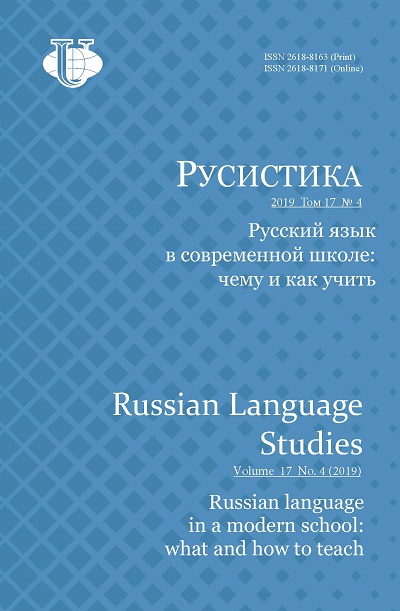A.D. Deikina’s scientific school: conceptual role of axiological approach in Russian language teaching
- Authors: Alekseeva O.V.1
-
Affiliations:
- Voronezh State Pedagogical University
- Issue: Vol 17, No 4 (2019): RUSSIAN LANGUAGE IN A MODERN SCHOOL: WHAT AND HOW TO TEACH
- Pages: 414-427
- Section: Scientific Review
- URL: https://journals.rudn.ru/russian-language-studies/article/view/22432
- DOI: https://doi.org/10.22363/2618-8163-2019-17-4-414-427
- ID: 22432
Cite item
Full Text
Abstract
The article describes the issues of axiological linguodidactics exemplified in methodical studies of A.D. Deikina’s scientific school: linguistic substantiation of axiological aspect in Russian language teaching, culturological component of pupils’ value system, new technologies for axiological skills development at Russian language lesson, philology students’ value system development as a professional competence. Conceptual features have been defined in scientific school research: focus on personality development, social experience acquisition, training the aptitude to various cooperation with the surrounding community. The scientific school works reflect conceptual development of linguistic and methodical training for Russian language teachers, focused on increasing pupils’ learning and cognitive motivation and improving their personal, metasubject and subject achievements. The scientific novelty of the research is defined by the key idea of anthropocentricity, integrity of essential components of axiological methodology, multifacetedness of approaches to text-oriented language studies. The scientific research in the article shows the development of Russian language teaching methodology in the first decades of the XXI century. The value of the article for contemporary school education lies in the fact that axiological linguistic methodology assists in developing cultural identity of future Russian citizens.
About the authors
Olga V. Alekseeva
Voronezh State Pedagogical University
Author for correspondence.
Email: alekseevaov@list.ru
Doctor of Pedagogical Sciences, Associate professor, professor at the Department of Theory, History and Russian Language and Literature teaching methodology
86 Lenina St., Voronezh, 394043, Russian FederationReferences
- Alekseeva, O.V. (2010). Realizatsiya funktsionalnogo printsipa pri izuchenii morfologii v shkol’nom kurse russkogo yazyka [Functional principle realization in studying morphology in Russian language school course]. (Doctoral dissertation, Moscow). (In Russ.).
- Alekseeva, O.V. (2015). Sovremennyi urok morfologii v shkole [Contemporary morphology lesson at school].Moscow: MGOU Publ. (In Russ.).
- Alekseeva, O.V. (2016). Functional approach in pragmatist paradigm of contemporary education. Science and School, 6, 130—134. (In Russ.).
- Aseeva, D.V. (2015). Razvitiye issledovatel’skikh umeniy uchashchikhsya v protsesse raboty nad esteticheskoi funktsiei grammaticheskikh form (5—7 classy) [Pupils research competence development at aesthetic function of grammar forms work process (5—7 grades)]. (Candidate dissertation, Orenburg). (In Russ.).
- Buslayev, F.I. (1941). O prepodavanii otechestvennogo yazyka [On teaching the native language]. Leningrad: Uchpedgiz Publ. (In Russ.).
- Deikina, A.D. (1990). Obucheniye i vospitaniye na urokakh Russkogo yazyka [Education and upbringing at Russian language lesson]. Moscow: Prosveshcheniye Publ. (In Russ.).
- Deikina, A.D. (1998). Velikii uchitel’ F.I. Buslayev (k 180 letiyu so dnya rozhdeniya) [The great teacher F.I. Buslayev (to 180th anniversary of the birth)]. Russkii yazyk v shkole [Russian Language at school], (3), 56—60. (In Russ.).
- Deikina, A.D., & Yanchenko, V.D. (2007). Cradle of Russian language methodology (to 90th anniversary of the First all-Russian Congress of Russian language secondary school teachers). Russian Language at school, (1), 48—51. (In Russ.).
- Deikina, A.D. (Ed.). (2009). Aksiological aspects of Russian language teaching (professional and general education levels). Proceedings of International research and practice conference (19th—20th March 2009). Moscow: MPGU; Yaroslavl: Remder Publ. (In Russ.).
- Deikina, A.D. (Ed.). (2012). Versatility of methodological approaches to Russian Language education. Proceedings of International research and practice conference (15th—16th March 2012). Moscow: MPGU; Yaroslavl: Remder Publ. (In Russ.).
- Deikina, A.D. (2015). Strategiya razvitiya metodiki prepodavaniya russkogo yazyka v usloviyakh realizatsii sovremennykh obrazovatel’nykh standartov [Development strategy for Russian language teaching methodology in contemporary educational standards realization]. Moscow: Forum Publ. (In Russ.).
- Deikina, A.D. (2017). Open methodology: axiology in contemporary studies and Russian language school textbooks. Contemporary tendencies in Russian language teaching methodology development, (35—40). Moscow: Sputnik Publ. (In Russ.).
- Deikina, A.D. (2019). Aksiologicheskaya metodika prepodavaniya russkogo yazyka [Axiological methodology of Russian language teaching]. Moscow: MPGU Publ. (In Russ.).
- Drozdova, O.E. (2017). Metapredmetnyi podkhod k obucheniyu russkomu yazyku v raznykh pedmetnykh oblastyakh shkol’nogo obrazovaniya [Metasubject approach to Russian language teaching in different subjects at school]. (Doctoral dissertation, Moscow). (In Russ.).
- Isayeva, N.A. (2016). Sovremenniye stategii lingvometodicheskoi podgotovki bakalavra pedagogicheskogo obrazovaniya (profil russkii yazyk) [Modern strategies of linguomethodical education of pedagogical Bachelors in Russian language profile]. (Doctoral dissertation, Moscow). (In Russ.).
- Kulayeva, G.M. (2008). Esteticheskii ideal v sisteme formirovaniya tsennostnogo otnosheniya uchaschikhsya k russkomu yazyku [Esthetic ideal in pupils’ value-based attitude towards Russian language development]. (Doctoral dissertation, Moscow). (In Russ.).
- Levushkina, O.N. (2014). Lingvokulturologicheskaya kharakteristika teksta v shkol’nom obuchenii: teoriya I praktika [Linguo culturological characteristics of text in school education: theory and practice]. (Doctoral dissertation, Moscow). (In Russ.).
- Ryabukhina, E.A., & Yanchenko, V.D. (Eds.). (2014). Sovremennaya metodicheskaya kontseptsiya lichnostnogo razvitiya uchaschikhsya v protsesse izucheniya russkogo yazyka (k yubileyu professora
- A.D. Deikinoy) [Modern methodical concept of students’ personal development at Russian language study (to prof. Deikina, A.D. anniversary)]. Moscow—Perm’: OT I DO Publ. (In Russ.).
- Ryabukhina, E.A. (2013). Modelirovaniye differentsirovannogo obucheniya rechevoi deyatel’nosti v starshikh klassakh na osnove kompetentnostnogo podkhoda [Forming differential education of speech activity in senior school on the base of competence approach]. (Doctoral dissertation, Moscow). (In Russ).
- Skryabina, O.A. (2010). Kognitivno-kommunikativnii podkhod v obuchenii pravopisaniyu kak tekstooformlyayuschei deyatel’nosti (10—11 klassy) [Cognitive and communicative approach to spelling education as text-forming activity (10th—11th grades)]. (Doctoral dissertation, Moscow). (In Russ.).
- Yanchenko, V.D. (2012). Nauchno-metodicheskoye naslediye posledney treti XX veka i yego potentsial v sisteme professional’noi podgotovki uchitelei-slovestnikov [Scientific and methodological heritage of
- the last third of XX century and its potential in professional education of teachers-philologists]. (Doctoral dissertation, Moscow). (In Russ.).
Supplementary files














